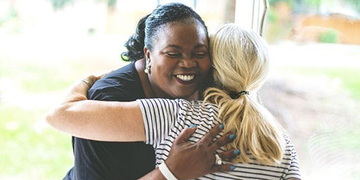Taking Care of Your Mental Health After Weight Loss Surgery & Utilizing Support Systems
by Anthony Benjamin on Oct 12, 2022

Taking Care of Your Mental Health After Weight Loss Surgery & Utilizing Support Systems
 No matter who you are, bariatric surgery can be a stressful and overwhelming experience. It can also lead to issues that negatively impact your mental health, body image, and weight loss after surgery. If you struggle with anxiety or depression, you should know that bariatric surgery is not a “cure-all”. You may still experience feelings of sadness or hopelessness after surgery.
No matter who you are, bariatric surgery can be a stressful and overwhelming experience. It can also lead to issues that negatively impact your mental health, body image, and weight loss after surgery. If you struggle with anxiety or depression, you should know that bariatric surgery is not a “cure-all”. You may still experience feelings of sadness or hopelessness after surgery.
It’s best to address mental health issues and addictions before weight loss surgery, and many weight loss centers require patients to undergo mental health assessments. This preparation helps identify behaviors and emotional factors that may impact coping and adjustment after surgery and the associated lifestyle changes. (For more information see Addiction Awareness: Understanding the Risks After Bariatric Surgery.)
At ProCare Health, we want you to know there are options. From doctors to bariatric surgery support groups, you can get the help you need, before or when you need it.
Post-Surgery Depression: When to Seek Help from Bariatric Surgery Support Groups
For some patients, depression and anxiety can worsen after weight loss surgery. While most people approach the surgery with a positive attitude, you should know that depression and anxiety are normal after bariatric surgery.
Following surgery, you may worry about re-developing old eating habits or grieve the loss of your favorite foods. You may also struggle to accept your new body or lifestyle. Regardless of how you feel, you are not alone. Your doctor or bariatric surgeon – as well as loved ones and bariatric surgery support groups – are there for you. If you worry about developing post-surgery depression or anxiety about any of the following changes, you should talk to your doctor:
- Increased stress after surgery
- Rate of weight loss and plateaus
- Appetite changes
- Short-term dietary changes
- A long-term, healthy diet
- New exercise and physical activity regimen
- Mistakes and “slips” during weight loss journey
- Loose skin after weight loss
- Wardrobe changes after weight loss surgery
Additionally, you may also want to pay attention to early signs of depression or anxiety. If you experience any of these symptoms, consult with your doctor immediately:
- Trouble concentrating and making decisions
- Tiredness, fatigue, insomnia, or other sleep-related issues
- Feelings of guilt, worthlessness, or hopelessness
- Memory difficulties or personality changes
- Loss of appetite
- Persistent sad or anxious feelings
- Irritability
- Suicidal thoughts or feelings
Bariatric Surgery Support Groups: Who to Seek Help From
Whether online or in-person, a support group can help you find the community you need after weight loss surgery. It can also be an encouraging way to communicate with other patients who have experienced the same hardships and feelings as you.
Join a Local Support Group
To achieve success after bariatric surgery, you need support from people who understand what you’re going through. Bariatric surgery support groups can provide help for those going through a challenging time and mentally prepare for life before or after weight loss surgery.
A bariatric surgery support group can also provide you with educational resources, as well as the motivation you need to push through. Weight loss surgery support groups will also celebrate your milestones with you, which may help if you feel alone throughout your journey.
To find a bariatric surgery support group near you, check with your bariatric program for suggestions. You can also look at local hospitals, churches, colleges, or universities.

Find an Online Community
It can be tempting to compare your body to people you see online, especially if you struggle with anxiety or depression.
With today’s busy schedules, you may not be able to join an in-person support group. Despite their negative reputation regarding body image issues, social media channels may play a crucial role in your online search for bariatric surgery support groups.
#iambariatricpatient
Rather than an online forum or a traditional weight loss support group, #iambariatricpatient is a hashtag that can be found on Facebook, Twitter, and Instagram. Whether you are looking for a source of inspiration or want to share your weight loss journey with other bariatric patients, you can do just that.
BariatricFoodie
Bariatric Foodie is a blog run by Nikki, a gastric bypass patient. Filled with recipes, challenges, and product reviews, Nikki proves that eating after weight loss surgery is anything but boring.
This forum is organized into easy to find categories. It is a place to interact with people and learn from the weight loss support community.
This online community features articles, recipes, and a robust forum that has more than 200 topics on surgery type, fitness, nutrition, medical conditions, and many more. They are dedicated to the education, empowerment, and support of all people affected with obesity.
Seek Help from Family and Friends
Your loved ones are in the best position to understand what you are going through. They should be aware of your post-surgery modifications and needs, as well as how you are feeling and if they can do anything to help you stay on track.
There may also be issues you only feel comfortable sharing with loved ones, as compared to a large support group filled with strangers. Your family and friends may be able to motivate you and help you achieve your weight loss goals.
Additionally, you should let people know how your new lifestyle will affect them, especially if it is a significant other, a parent, a child, or a lifelong friend.

Talk to Your Doctor
If you struggle with mental health, your doctor or bariatric surgeon can be your greatest resource. They can help you navigate your weight loss surgery by providing you with helpful tips and educational tools. They can also help you find ways to feel confident in your new lifestyle and eating habits.
Believe in Yourself
 Weight loss surgery is a difficult journey for everyone. If you struggle with anxiety or depression, it can be challenging to feel confident. Still, if you want to be successful in your weight loss journey, you must take care of yourself, seek help if necessary, and continue to move forward.
Weight loss surgery is a difficult journey for everyone. If you struggle with anxiety or depression, it can be challenging to feel confident. Still, if you want to be successful in your weight loss journey, you must take care of yourself, seek help if necessary, and continue to move forward.
ProCare Health is Here to Support You Every Step of the Way
At ProCare Health, your health is our top priority. We provide you with a variety of products, from a multivitamin specifically designed for bariatric patients to other supplements that you need to stay healthy.
We also have Facebook, Instagram, and Twitter pages, as well as regular emails and articles with wellness tips, recipes, motivation, and more to help you on your journey to a healthier lifestyle.
We strive to provide you with only the best in quality because we know how important it is to your health and well-being. Feel free to contact us with questions or to place an order today!






